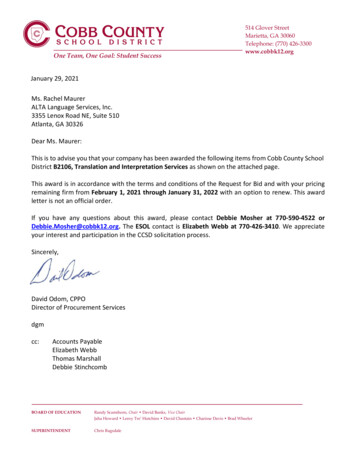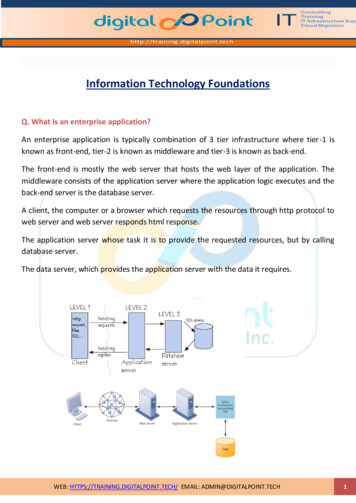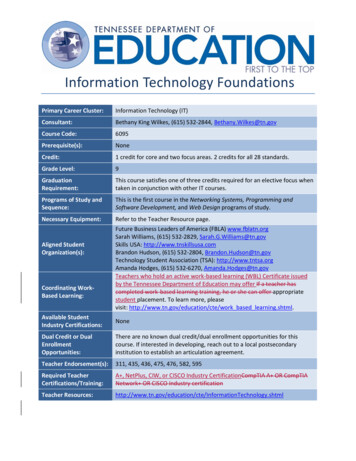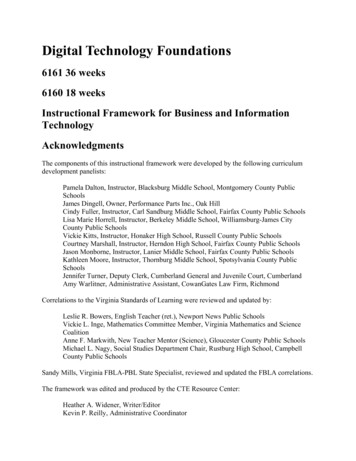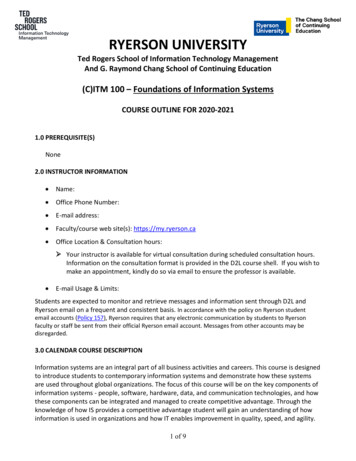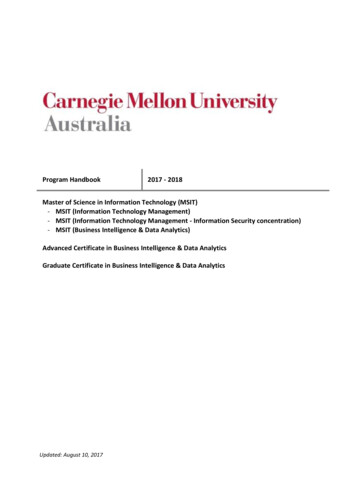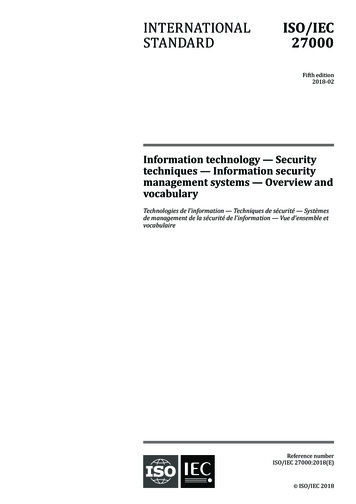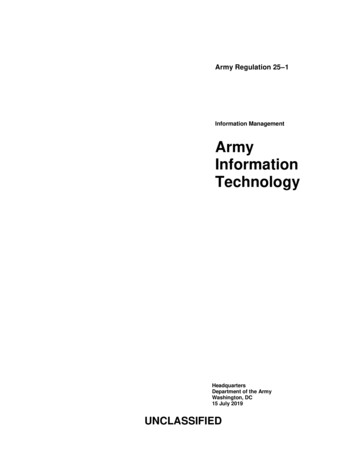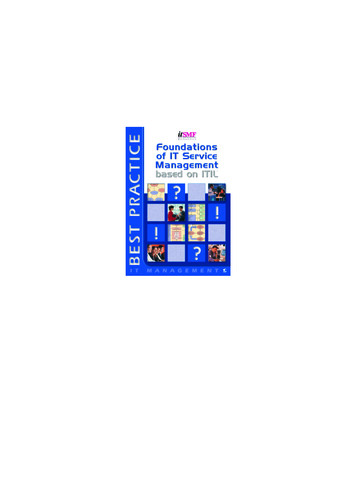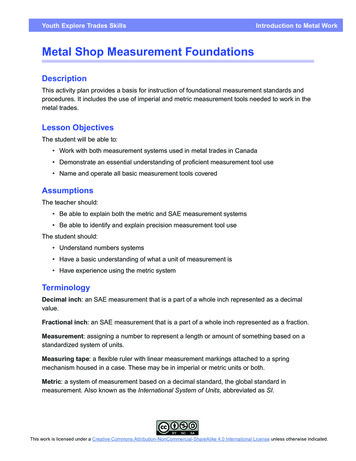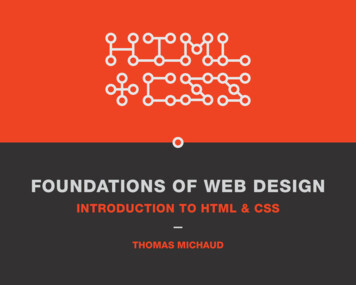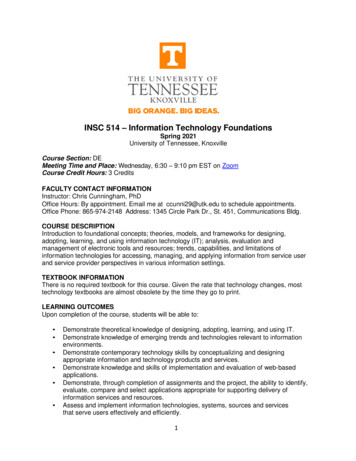
Transcription
INSC 514 – Information Technology FoundationsSpring 2021University of Tennessee, KnoxvilleCourse Section: DEMeeting Time and Place: Wednesday, 6:30 – 9:10 pm EST on ZoomCourse Credit Hours: 3 CreditsFACULTY CONTACT INFORMATIONInstructor: Chris Cunningham, PhDOffice Hours: By appointment. Email me at ccunni29@utk.edu to schedule appointments.Office Phone: 865-974-2148 Address: 1345 Circle Park Dr., St. 451, Communications Bldg.COURSE DESCRIPTIONIntroduction to foundational concepts; theories, models, and frameworks for designing,adopting, learning, and using information technology (IT); analysis, evaluation andmanagement of electronic tools and resources; trends, capabilities, and limitations ofinformation technologies for accessing, managing, and applying information from service userand service provider perspectives in various information settings.TEXTBOOK INFORMATIONThere is no required textbook for this course. Given the rate that technology changes, mosttechnology textbooks are almost obsolete by the time they go to print.LEARNING OUTCOMESUpon completion of the course, students will be able to: Demonstrate theoretical knowledge of designing, adopting, learning, and using IT.Demonstrate knowledge of emerging trends and technologies relevant to informationenvironments.Demonstrate contemporary technology skills by conceptualizing and designingappropriate information and technology products and services.Demonstrate knowledge and skills of implementation and evaluation of web-basedapplications.Demonstrate, through completion of assignments and the project, the ability to identify,evaluate, compare and select applications appropriate for supporting delivery ofinformation services and resources.Assess and implement information technologies, systems, sources and servicesthat serve users effectively and efficiently.1
Class1Analyze and apply information policies and information-related laws that influencethe delivery of information resources throughout society.Manage a wide variety of information technologies including emergingtechnologies at work.Apply lessons learned from real-world IT case examples in all types of informationenvironments.DateJan 20TopicsAssignmentsIntroduction Ground rules and expectations IT skillsModule 1. Technology Assessment & Planning Writing Technology Plan forLibrarieso Social media policies2Jan 27 Making Smart IT Choices:Government policies,organizational culture, businessprocesses, and technologysolutionsTheory Project Management Principles:Managing Scope, Time, Cost,Quality, HR, Communication, andRisksModule 2. Environmental Scan of ITIntroduction to Computers3Feb 3 Components of System Unit:Motherboard: Processor, A/VCards, & Memory, Power Supply:AC & DC, Drive Bays, Ports &Connectors, and Bus: Data &Address Storage: Capacity, Access time,& Types of Storage Input Devices Output Devices2Assignment 1: ITSkills Assessment(5 points)
IT Landscape for InformationAgencies OSS Concepts and ILS forLibraries45678Feb 10 3-D Printers RFID Robots & ChatBot Makerspace Assistive Technologies E-Books QR CodesAssignment 2:Social Media Plan(25 points)Module 3. Designing and Developing ITDeveloping in-house IT solutions(I) HTML basics Writing sample pagesFeb 17 Embedding media Adding tables Anchors Elements and AttributesDesigning in-house IT solutions (II) Requirement gathering forFeb 24 building customized DBMS Entity-Relationship Diagram Introduction to Relational DBMSMarch 3 Usability User Experience User-Centered DesignAssignment 3:HTML Assignment(20 points)Module 4. Training Users & Staff for Using ITBroadcasting tools Podcasting ScreencastingTheory Situated learningMarch Technology self-efficacy10 Learning new (IT)concepts3
Module 5. Deploying IT for Serving PatronsNetworking PAN, MAN, LAN, WAN MAC, IP, and Port Addresses10March17 Analyzing IPV4 addresses andIPv6 addressesAssignment 4:Evaluating MobileApps (20 points) DOS commands for networking Hardware for networking9March24Attend the Library 2.0 ConferenceMarch 25 & 26Register at https://library20.com/Theories on adoption and postadoption of IT Technology acceptance model Unified theory of acceptance anduse of technology11March31 Theory of planned behaviour Diffusion of innovation Expectation-Confirmation Modelo Extended ExpectationConfirmation Model of IT Technology–Organization–EnvironmentModule 6. Managing ITIT Security Protecting Technology andTechnology Users Security, Safety, Ethics, &Privacy12April 7o Vulnerability vs. Threat,Security Risks, & Cybercrimeo Firewall, Antivirus, & IntrusionDetectiono Encryption & Digital Signature4Assignment 5:Podcast andScreencast (25points)
Content Management Systems Concept13April 14 Examples: Drupal,SharePoint, and WordPressTheory Knowledge managementModule 7. Measuring Return on Investment (ROI) in ITWeb Analytics List of key social software andtheir management14April 21 Measuring ROI and metrics Google Analytics Search engine optimizationApril 28No Class DayAssignment 6:Reflection (5 points)COURSE DESIGNThis course adopts an active learning approach. Students are required to complete all readings,attend all class lectures, complete graded activities and assignments, and participate in all classactivities, including instructor-led and student-led discussions, and small-group and individualactivities. All readings will be uploaded on the course Canvas site.DISCOVERY LEARNING APPROACHA learning strategy that you can use in this course is called the discovery frame. The discoveryframe emphasizes learning from your own experiences – discovering new knowledge ratherthan only importing it from someone else's knowledge base. The key characteristics of thisframe are: (1) All resources necessary for learning are resident in the individual. (2) It is learningthrough doing. (3) It is information gathering with evaluation. Ask yourself: "How did I do that?Can I do it again?" rather than "Did I do it right?" (4) It causes you to identify behavior patternsthat make a difference for you. (5) It focuses on success and the use of feedback – you cannotsucceed unless you stop and ask: "How did I succeed?" The use of the discovery framehighlights additional goals in this course: to help you learn how to learn, and to learn thatlearning can be fun. This course aims to teach you important concepts and procedures that willhelp you continue to learn about knowledge management from your own experiences. Theamount of knowledge and skills you will gain from this course will depend on the amount of timeand work you invest every week. Information sharing, interaction, and collaboration areessential components of this learning approach.5
MAPPING OF ASSIGNMENTS ON PROGRAM OUTCOMEAssignmentAssignment 1: IT SkillsAssignment 2: Social Media PlanAssignment 3: HTML AssignmentAssignment 4: Evaluating Mobile AppsAssignment 5: Podcast and ScreencastAssignment 6: ReflectionTotal Points5 points25 points20 points20 points25 points5 pointsProgram Outcome4, 53, 46, 93, 46, 73COMMUNICATION The course instructor is required to communicate with students through UTK emailaddress. If you prefer to use another address, consult the OIT Helpdesk to obtaindirections for forwarding your UTK mail to your preferred address if you don’t wishto check both accounts. Feel free to contact me for questions or to share ideas! To ensure quick response,start your message subject line with INSC 514. I will reply to your messages within48 hours. This course is offered in a virtual mode using Canvas & Zoom. The delivery of thecourse content will include lectures, videos, discussions, live demonstrations, andhands-on training activities. All lecture slides will be posted on Canvas. Read the class announcement posted onCanvas to stay current with course matters. Submit assignments on Canvas. Do not email them to the instructor. For assistance at any time during class, please contact DE support at 865-974-3117.COMPUTING REQUIREMENTSYou must have adequate computing skills, including but not limited to use of word processing,Web browsers, e-mail, listservs, Canvas, and Collaborate software. You must learn how tosubmit your assignments using Canvas. The Office of Information Technology (OIT) providestraining classes in using varied technologies for students at no charge (advance registration isrequired).6
You must obtain a UT email account and UT Volweb (Linux) account and subscribe to theSIS student listserv. In addition, you must have the PowerPoint Reader or the regularPowerPoint software installed on your computer in order to download the lecture notesfrom Canvas.CLASS ATTENDANCE POLICYIt is assumed that each student be present and speak in class. Missing more classes orfailing to participate will lower your grade; frequent participation will raise the grade.Regular attendance is required and necessary. A substantial portion of your grade will be basedon in-class work and participation. Unexplained absences will affect your grade. Contact me assoon as possible if you cannot attend class. If you will be absent from class, you must: Inform me in advance or as soon as possible after class Submit any work due from the missed class period Listen to class recording Obtain notes, handouts, etc. from Canvas Check with classmates for notes, announcements, etc.Acceptable reasons for absence from class include: Illness Serious family emergencies Special curricular or job requirements (e.g., judging trips, field trips, professionalconferences) Military obligation Severe weather conditions Religious holidays Participation in official university activities such as music performances, athleticcompetition or debate Obligations for court imposed legal obligations (i.e., jury duty, subpoena)Missing more than one class meeting for reasons other than those listed above will have anegative impact on your course participation grade.INCLEMENT WEATHER“The chancellor (or appointed representative) may officially close or suspend selected activitiesof the university because of extreme weather conditions. When a decision to close is made,information is distributed to the campus community, shared with local media, and posted on thefront page at http://utk.edu. (Hilltopics, p. 55)( 6.pdf ). SIS will cancel classes when UT is closed. Please check the SIS student listserv(UTKSIS-L@LISTSERV.UTK.EDU) for messages about closing.7
DISABILITIES THAT CONSTRAIN LEARNINGAny student who feels s/he may need an accommodation based on the impact of a disabilityshould contact Student Disability Services in Dunford Hall, at 865-974-6087, or by video relayat, 865-622-6566, to coordinate reasonable academic accommodations.CIVILITYCivility is genuine respect and regard for others: politeness, consideration, tact, good manners,graciousness, cordiality, affability, amiability and courteousness. Civility enhances academicfreedom and integrity, and is a prerequisite to the free exchange of ideas and knowledge in thelearning community. Our community consists of students, faculty, staff, alumni, and campusvisitors. Community members affect each other’s well-being and have a shared interest increating and sustaining an environment where all community members and their points of vieware valued and respected. Affirming the value of each member of the university community, thecampus asks that all its members adhere to the principles of civility and community adopted bythe campus: http://civility.utk.edu/.CCI DIVERSITY STATEMENTThe College of Communication and Information recognizes that a college diverse in its people,curricula, scholarship, research, and creative activities expands opportunities for intellectualinquiry and engagement, helps students develop critical thinking skills, and prepares studentsfor social and civic responsibilities. All members of the College benefit from diversity and thequality of learning, research, scholarship and creative activities is enhanced by a climate ofinclusion, understanding and appreciation of differences and the full range of humanexperience. As a result, the College is committed to diversity and equal opportunity and itrecognizes that it must represent the diversity inherent in American society. The College isacutely aware that diversity and fairness are foundations that unite the College’s faculty, staff,students, and the larger communication and information community.UT ODS DISABILITY STATEMENTAny student who feels he or she may need an accommodation based on the impact of adisability should contact the Office of Disability Services (ODS) at 865-974-6087 in 100 DunfordHall to document their eligibility for services. ODS will work with students and faculty tocoordinate reasonable accommodations for students with documented disabilities."ACADEMIC INTEGRITYStudents should be familiar and maintain their Academic Integrity described 5-16.pdf , p. 15 as: “Study, preparation andpresentation should involve at all times the student’s own work, unless it has been clearlyspecified that work is to be a team effort. Academic honesty requires that the student presenthis or her own work in all academic projects, including tests, papers, homework, and classpresentation. When incorporating the work of other scholars and writers into a project, thestudent must accurately cite the source of that work.”Students should abide by the Honor Statement described in the same Hilltopics, p. 73:“An essential feature of The University of Tennessee is a commitment to maintaining anatmosphere of intellectual integrity and academic honesty. As a student of the University, I8
pledge that I will neither knowingly give nor receive any inappropriate assistance in academicwork, thus affirming my own personal commitment to honor and integrity.”PLAGIARISMPlagiarism in any of its several forms is intolerable, and attention to matters ofdocumentation in all written work is expected and required. Inadvertence, alleged lack ofunderstanding, or avowed ignorance of the various types of plagiarism are not acceptableexcuses.Specific examples of plagiarism are:1. Copying without proper documentation (quotation marks and a citation) written orspoken words, phrases, or sentences from any source;2. Summarizing without proper documentation (usually a citation) ideas from anothersource (unless such information is recognized as common knowledge);3. Borrowing facts, statistics, graphs, pictorial representations, or phrases withoutacknowledging the source (unless such information is recognized as commonknowledge);4. Collaborating on a graded assignment without the instructor’s approval;5. Submitting work, either in whole or in part, created by a professional service andused without attribution (e.g., paper, speech, bibliography, or photograph).Students who may be unsure of the nature of plagiarism should consult the instructor or aguide for writing research reports. (Additional resources are available nfractions of academic integrity are penalized according to the severity of the infractionbut may include a course grade of "XF."ASSIGNMENTS AND GRADINGStudent work is assigned a grade based on quality of thought and writing style, thoroughness ofresearch and of references, appropriateness of length, and originality. Only exceptional work willreceive an "A" grade. Deliverables that are received after the due date will be assigned a lowergrade than would otherwise be received. All sources must be cited, quotations must be inquotation marks and attributed correctly. Not doing so constitutes plagiarism.DUE DATES AND LATE ASSIGNMENTSAssignments should be submitted to the “assignments” area of Canvas and are due (officially)at 11:59 p.m. EST on the due date listed on the syllabus. I will download the submissions fromCanvas early the next morning. I will download course deliverables from Canvas ONCE. 15% of total grade will be deducted for every 24 hours the deliverable (e.g.,assignments, online discussion entries, etc.) is not turned in.o You will also lose points for submitting a wrong file.In case of emergency, please contact the instructor before the due date to avoid losingpoints for the late submission.9
INCOMPLETESBased on adopted University of Tennessee-Knoxville and SIS policy, a grade of I(Incomplete) is reserved for emergencies that prevent the student from completing thecourse on time. Incompletes are granted only under "the most unusual of circumstances"and solely at the discretion of the instructor. Plan your semester’s course of study carefullyto insure sufficient time to complete the required work.For students who simply "disappear" without contacting the instructor and withoutcompleting the required form, an "F" is submitted.ASSIGNMENTSAssignments1. IT Skills2. Social Media Plan3. HTML Essay4. Reviewing MobileApps5. Podcast andScreencast6. ReflectionTotal Points5 points25 points20 pointsDue Date27-Jan10-Feb3-Mar20 points17-Mar25 points7-Apr5 points28-AprEVALUATION You will be responsible to check if you have received any feedback from me onthe course Canvas site. You will also be responsible to check if your submission is graded. Semester grades will be assigned according to the following scale.AAB BBC CDF90 87-89.9985-86.9980-84.9977-79.9975-76.9970-74.99(4 quality points per semester hour) superior performance.(3.7 quality points per semester credit hour) intermediate grade performance.(3.5 quality points per semester hour) better than satisfactory performance.(3 quality points per semester hour) satisfactory performance.(2.7 quality points per semester credit hour) intermediate grade performance.(2.5 quality points per semester hour) less than satisfactory performance.(2 quality points per semester hour) performance well below the standardexpected of graduate students.60-69.99 (1 quality point per semester hour) clearly unsatisfactory performance andcannot be used to satisfy degree requirements.59.99 (no quality points) extremely unsatisfactory performance and cannot be usedto satisfy degree requirements.10
I(no quality points) a temporary grade indicating that the student has performedsatisfactorily in the course but, due to unforeseen circumstances, has beenunable to finish all requirements. An I is not given to enable a student to doadditional work to raise a deficient grade. The instructor, in consultation withthe student, decides the terms for the removal of the I, including the time limitfor removal. If the I is not removed within one calendar year, the grade will bechanged to an F. The course will not be counted in the cumulative grade pointaverage until a final grade is assigned. No student may graduate with an I onthe record.S/NC(carries credit hours, but no quality points) S is equivalent to a grade of B orbetter, and NC means no credit earned. A grade of Satisfactory/No Credit isallowed only where indicated in the course description in the GraduateCatalog. The number of Satisfactory/No Credit courses in a student's programis limited to one-fourth of the total credit hours required.P/NP(carries credit hours, but no quality points) P indicates progress towardcompletion of a thesis or dissertation. NP indicates no progress or inadequateprogress.(carries no credit hours or quality points) indicates that the student officiallywithdrew from the course.WCOURSE EVALUATIONYou will be invited to evaluate the course at the end of the term. Please participate in thisvaluable process. I also invite your comments throughout the course and read allcomments, suggestions, and recommendations.The instructor reserves the right to revise, alter or amend this syllabus asnecessary. Students will be notified in writing / email of any such changes.Last updated on Dec 30, 202011
1 INSC 514 – Information Technology Foundations Spring 2021 University of Tennessee, Knoxville Course Section: DE Meeting Time and Place: Wednesday, 6:30 – 9:10 pm EST on Zoom Course Credit Hour
